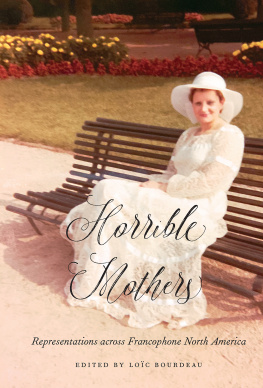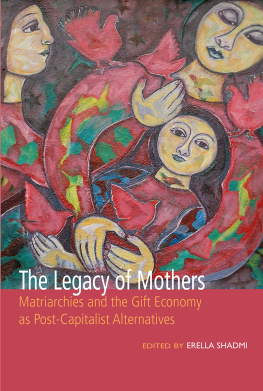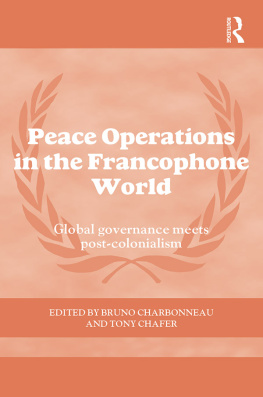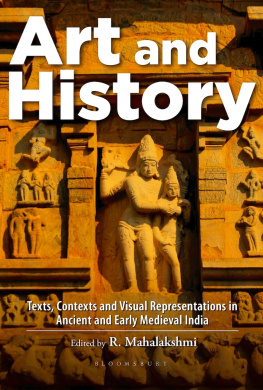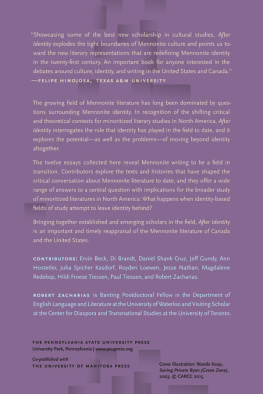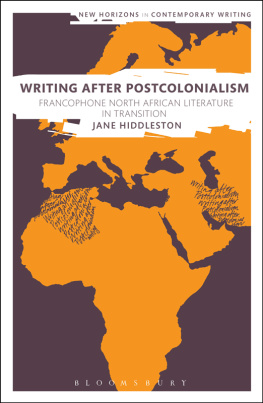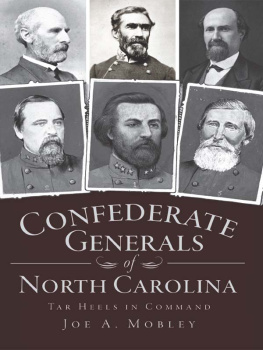Loïc Bourdeau (editor) - Horrible mothers : representations across francophone North America
Here you can read online Loïc Bourdeau (editor) - Horrible mothers : representations across francophone North America full text of the book (entire story) in english for free. Download pdf and epub, get meaning, cover and reviews about this ebook. year: 2019, publisher: University of Nebraska Press, genre: Politics. Description of the work, (preface) as well as reviews are available. Best literature library LitArk.com created for fans of good reading and offers a wide selection of genres:
Romance novel
Science fiction
Adventure
Detective
Science
History
Home and family
Prose
Art
Politics
Computer
Non-fiction
Religion
Business
Children
Humor
Choose a favorite category and find really read worthwhile books. Enjoy immersion in the world of imagination, feel the emotions of the characters or learn something new for yourself, make an fascinating discovery.
- Book:Horrible mothers : representations across francophone North America
- Author:
- Publisher:University of Nebraska Press
- Genre:
- Year:2019
- Rating:3 / 5
- Favourites:Add to favourites
- Your mark:
- 60
- 1
- 2
- 3
- 4
- 5
Horrible mothers : representations across francophone North America: summary, description and annotation
We offer to read an annotation, description, summary or preface (depends on what the author of the book "Horrible mothers : representations across francophone North America" wrote himself). If you haven't found the necessary information about the book — write in the comments, we will try to find it.
Horrible mothers : representations across francophone North America — read online for free the complete book (whole text) full work
Below is the text of the book, divided by pages. System saving the place of the last page read, allows you to conveniently read the book "Horrible mothers : representations across francophone North America" online for free, without having to search again every time where you left off. Put a bookmark, and you can go to the page where you finished reading at any time.
Font size:
Interval:
Bookmark:
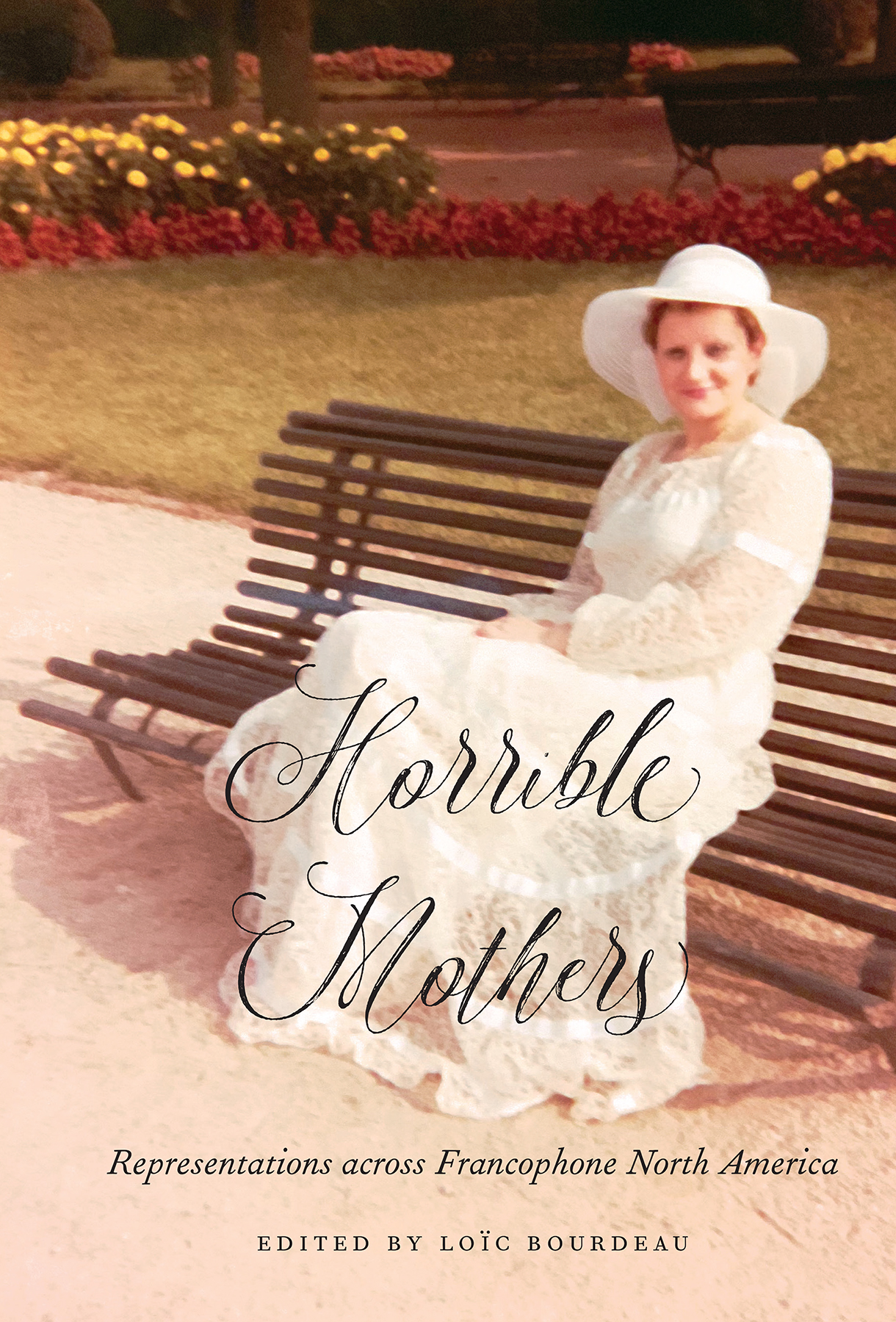
This multidisciplinary collection of essays from a francophone North American context constitutes an important challenge to normalizing and oppressive discourses of motherhood that fail to take account of the much messier and often ambivalent nature of lived maternal experiences.... We are reminded in this collection of the dangers of the cultural idealization of mothers and the ongoing need to deconstruct normative motherhood from a feminist perspective.
Julie Rodgers, lecturer in French studies and the Motherhood Project at Maynooth University
Edited by Loc Bourdeau
University of Nebraska Press | Lincoln
2019 by the Board of Regents of the University of Nebraska
Cover designed by University of Nebraska Press; cover image is courtesy of the author.
Author photo is courtesy of the author.
All rights reserved.
Library of Congress Cataloging-in-Publication Data
Names: Bourdeau, Loc, editor.
Title: Horrible mothers: representations across francophone North America / edited by Loc Bourdeau.
Description: Lincoln: University of Nebraska Press, [2019] | Includes bibliographical references and index.
Identifiers: LCCN 2019003994
ISBN 9780803293984 (cloth: alk. paper)
ISBN 9781496218278 (ePub)
ISBN 9781496218285 (mobi)
ISBN 9781496218292 ( PDF )
Subjects: LCSH : French-Canadian literatureHistory and criticism. | French American literatureHistory and criticism. | Mothers in literature. | Franco-AmericansIn literature. | Motion picturesQubec (Province)History. | Mothers in motion pictures.
Classification: LCC PQ 3902 . H 67 2019 | DDC 840.9/352520971dc23
LC record available at https://lccn.loc.gov/2019003994
The publisher does not have any control over and does not assume any responsibility for author or third-party websites or their content.
To Marie-Thrse, my mother
Aujourdhui maman est morte.
Ou peut-tre hier, je ne sais pas.
Albert Camus, Ltranger
Loc Bourdeau
Pauline Henry-Tierney
Susan Pinette
Chelsea Ray
Alison Rice
Natalie Edwards
Lucie Hotte and Ariane Brun del Re
Susan Ireland and Patrice J. Proulx
Amy J. Ransom
Loc Bourdeau
Putting together this volume has been a wonderful reminder of the importance of collaboration in academia. As such, the first people I would like to thank are the generous and patient scholars who have joined me in this adventure (in order of appearance in the book): Pauline Henry-Tierney, Susan Pinette, Chelsea Ray, Alison Rice, Natalie Edwards, Lucie Hotte, Ariane Brun del Re, Susan Ireland, Patrice Proulx, and Amy Ransom. I am exceedingly grateful for your exciting contributions, your timeliness, and your overall flexibility.
I owe a significant debt to the late Prof. Lucille Cairns, who supervised my MA research at Durham University (UK) and introduced me to Jean-Marc Valles film C.R.A.Z.Y. The beauty of the maternal character and its reception sparked a lasting interest for questions of motherhood in literature and film. Lucille was a kind and supportive human being whose dedication to research has also been truly inspiring. During my doctoral studies at the University of California, Davis, I was fortunate to work under the supervision of equally outstanding and inspiring scholars. In particular, I would like to thank Dr. Jeff Fort for his constantly thorough feedback and encouragements, as well as his continued support after graduation. I thank the entire Department of French and Italian for its intellectual and financial support, as well as Dr. Elizabeth Constable (Women and Gender Studies) for making me a stronger feminist/queer scholar. I am also grateful to Dr. Jarrod Hayes, who codirected my dissertation and whose work in queer studies has influenced me greatly.
As a faculty member in the Department of Modern Languages at the University of Louisiana at Lafayette, I have received significant support from Dr. Caroline Huey (chair), who has helped me secure travel awards to present my work, along with an endowed professorship. Thank you to Ms. Regina LaBiche (operations manager) for chatting with me about horrible mothers and sharing her own maternal insights. I am grateful to all my colleagues in French and francophone studies, especially Prof. Fabrice Leroy and Prof. Monica Wright. They have become role models and generous friends. Monica, thank you for helping me proofread parts of this project and for your overall enthusiasm toward the project. Finally, I must express gratitude to Dean Jordan Kellman for his financial support (summer grants, travel expenses, etc.) and to my students for making teaching a joy.
This project would not have been possible and enjoyable without the unwavering support I received from Alicia Christensen, my editor at the University of Nebraska Press. Her professionalism, kindness, and overall understanding of the collaborative process lifted a weight off my shoulders. I thank her for choosing dedicated external readers whose comments have helped me (and the contributors) strengthen the final product. I am indebted to these readers, who spent a significant amount of time reading the entire book and provided detailed feedback.
I feel fortunate to have wonderful friends in my life who have listened to me when I needed to vent or discuss the project and distracted me when I needed a break. I thank my special someone for all the love and support I receive every day. Finally, I must thank my own mother, Marie-Thrse, who showed me what a strong, independent woman looks like, made sacrifices for my education, and remains a constant source of awe and inspiration. Thank you all for making my world a better place.
Loc Bourdeau
Le problme, peut-tre, cest que la maternit normale nest plus seulement, justement, normale. On ne peut plus se contenter (je mets entre guillemets parce que cest dj norme) de fournir nourriture, scurit et chaleur nos enfants. Il faut aussi tre crative. Elle fait des biscuits!... La mre crative nest quune autre variante de la mre parfaite... Mais elle colporte la mme pression, la mme troitesse de modles, le mme impratif de juger sa valeur selon le nombre de jaime quelle reoit sur Facebook.
Fanny Britt, Les tranches
There is nothing new about motherhood. There is still so much to say about it. A quick database search in one of Qubecs leading newspapers, Le Devoir, using the keyword maternit / motherhood yields over eighty articles on the subject since 2007. A similar search on Huffingtonpost.fr yields close to 250 pieces over the past six years. Spanning just a single decade, these numerous contributions show how the topic of motherhood continues to make headlines. Single motherhood, work-life balance, postpartum depression, childfree women, good or bad parenting, and maternal strugglesthese are some of the most recurring, trending themes. What further emerges from these sources is an overall move toward empathy and visibility, shedding light on a variety of lived experiences in an attempt, on the one hand, to validate ones choices and, on the other, to broaden the spectrum of acceptability. Likewise, twenty-first-century literary and cinematographic works seek to [r]endre prsent et visible lautre ([m]ake the other present and visible) (Gefen 150) not so much to gurir la marginalit, mais [pour] lexposer (heal marginality but to reveal it) (46). In this context of prolific media contributions on the subject of motherhood, this collaborative volume brings together a series of essays about literature, film, politics, and social issues relevant to francophone North America and constitutes a commitment to keeping the conversation going and to refuse silence. In this way,
Next pageFont size:
Interval:
Bookmark:
Similar books «Horrible mothers : representations across francophone North America»
Look at similar books to Horrible mothers : representations across francophone North America. We have selected literature similar in name and meaning in the hope of providing readers with more options to find new, interesting, not yet read works.
Discussion, reviews of the book Horrible mothers : representations across francophone North America and just readers' own opinions. Leave your comments, write what you think about the work, its meaning or the main characters. Specify what exactly you liked and what you didn't like, and why you think so.

